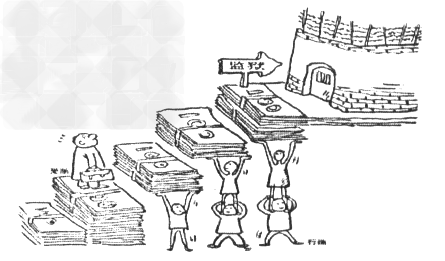阅读理解
Some expressions in English can be really puzzling. Have a look at the following to see how it
challenges your brainpower.
Homeric laughter
The "Homer" in this expression is the Greek poet. People laugh differently. Some laugh silently, while
others tend to laugh loudly. "Homeric laughter" refers to laughter of the latter kind. It is at times
uncontrollable, and the entire body shakes during the process. This kind of laughter is called Homeric
laughter because this is how the gods laughed in Homer's classics.
A three-ring circus
When you refer to a situation as being a three-ring circus, you are saying that it is a situation of
complete confusion. There are so many activities taking place all together that they leave you confused or
annoyed. The expression comes from the world of entertainment - the circus. The area where the artists
perform their acts is called the "ring". In the past, some of the circuses were so grand that they had three
acts taking place
simultaneouslyin three different "rings". The audience had to decide which "ring" they
wanted to focus on.
In the swim (of things)
When someone is in the swim of things, the individual is actively participating in the things happening
around him, as in "I've been ill, but soon I'll be back in the swim of thing." In the world of fishing, fishermen use the word "swim" to refer to the section of the lake/river where fish can be found in plenty. So, if you
are a fisherman and wish to catch a lot offish, where would you be? You would be "in the swim".
Chickens have come home to roost
The word "roost" refers to the place where birds rest. It could be anything - the branch of a tree, a
henhouse, etc. The expression is normally used to mean that the bad things that someone did in the past
have come back to bite or upset the individual. In other words, one has to face the consequences of the
deeds done in the past. The original form of this 700-year-old expression was "curses are like chickens;
they always come home to roost".
1. Which of the following can best describe the picture?

A. Homeric laughter
B. A three-ring circus
C. In the swim (of things)
D. Chickens have come home to roost
2. What does the underlined word "simultaneously'(Paragraph 3) mean?
A. At the same time.
B. Step by step.
C. All of a sudden.
D. One after another.
3. lf you want to know more about such expressions, which website will you probably visit?
A. www.chinadaily.com.cn/sports/China.html
B. www.chinadaily.com.cn/world/university.html
C. www.chinadaily.com.cn/culuture/language.html
D. www.chinadaily.com.cn/entertainment/fashion.html
4. The passage is written to_____.
A. tell readers some old and interesting stories
B. indicate the development of English phrases
C. correct some misunderstandings about words
D. explain the meanings and origins of some phrases